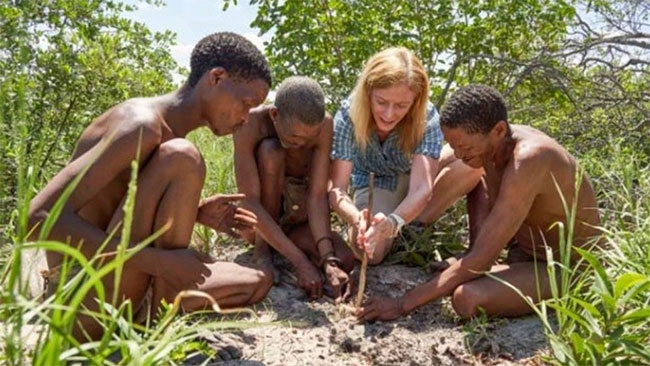Discover the 'birthplace' of modern people
The ancestors of modern humans appeared 200,000 years ago in northern Botswana before migrating to other parts of the world.
Africa is considered the cradle of modern Homo sapiens , but scientists have not been able to pinpoint exactly where our ancestors were born. A recent study conducted by the University of Sydney and Garvan Medical Research Institute, Australia seems to have helped us find the answer.

Researcher Vanessa Hayes learned how to create fire from the Khoesan people.(Photo: CNN).
The findings, published in Nature on Monday, show that the first modern humans appeared 200,000 years ago in the northern part of Botswana and parts of Namibia and Zimbabwe. Our ancestors lived and flourished for about 70,000 years in the region before climate change forced them to migrate out of Africa and eventually settled around the world.
The team said they took DNA samples from 200 Khoesans , the oldest people on Earth, still living in South Africa and Namibia today. They are thought to have the highest rates of haplogroup L0 monoclonal DNA , which is used to identify genetic populations.
"Mitochondrial DNA acts like a time map, accumulating changes over generations. Comparing complete DNA codes among different individuals can provide information about the degree of association between them, "explains researcher Vanessa Hayes.
The scientists then combined with archaeological data and geological records to create a genetic map that tracks the mitochondrial DNA group L0. The results showed that this mitochondrial DNA group lasted about 200,000 years, originating from a desert region south of the Zambezi River in Botswana, known as the Makgadikgadi-Okavango region , which used to be a huge lake with a large area. double the size of Lake Victoria today.
The team also looked at past climate change models to find out what motivated our ancestors to migrate out of Africa.
According to Axel Timmermann, co-author of the study, heavy rains due to climate change opened up "green corridors" to the northeast about 130,000 years ago and then to the southwest about 110,000 years ago. The rising humidity creates lush plant paths, leading modern humans to migrate from Botswana to other parts of the world.
- The oldest modern human skull outside Africa
- The 335,000-year-old fossil overturned the theory of human evolution
- New discovery about the birthplace of Buddha
- Video: Discover the oldest modern fossil outside Africa
- Discover the oldest traces of modern Europeans
- Found the birthplace of the Roman emperor Augustus
- Discover common ancestors of modern people and extinct people
- Lumbini, the birthplace of Shakyamuni Buddha
- Discover the birthplace of Zeus
- Discover the ancient
- Descendants of modern people and extinct people show up
- When did the modern people appear?
- Discover the skull of the first modern person in Europe
- Researching the East Sea by modern technology equipment
 Discovered an ancient centipede fossil 99 million years old
Discovered an ancient centipede fossil 99 million years old Discovered bat-like dinosaurs in China
Discovered bat-like dinosaurs in China Discovered a 200-year-old bronze cannon of the coast
Discovered a 200-year-old bronze cannon of the coast Discover 305 million-year-old spider fossils
Discover 305 million-year-old spider fossils World's most powerful telescope captures something that threatens to upend cosmology
World's most powerful telescope captures something that threatens to upend cosmology  'Time-traveling assassin' 13 billion years ago kills an entire galaxy
'Time-traveling assassin' 13 billion years ago kills an entire galaxy  The mystery of human lifespan limits
The mystery of human lifespan limits  13 'alien' skulls next to Mayan pyramids
13 'alien' skulls next to Mayan pyramids  How long does it take to reach another star system besides the Solar System?
How long does it take to reach another star system besides the Solar System?  For the first time, 5 super-objects from 13.6 billion years ago have been revealed.
For the first time, 5 super-objects from 13.6 billion years ago have been revealed. 